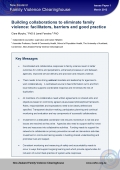 Issues Paper 1, March 2012
Issues Paper 1, March 2012
Authors: Clare Murphy, PhD and Janet Fanslow, PhD
Downloads
Key messages
- Coordinated and collaborative responses to family violence result in better outcomes for victims and perpetrators, enhanced processes in and between agencies, improved service delivery and provision and reduces violence.
- There needs to be strong national mandate and leadership for agencies to work collaboratively. A centralised source to feed information out to and from local networks supports coordinated response and minimises the risk of duplication.
- All members of a collaborative need written agreements on shared aims and objectives based on commonly agreed values-based philosophical framework. Roles, responsibilities and expectations need to be clearly defined and specified. Transparent decision-making, participatory planning and continual monitoring and evaluation are key components of successful collaborations.
- Investment in a dedicated coordinator role ensures momentum is not lost and issues are resolved as they arise. Agencies also need to support staff to invest time and resources into collaborative activities. Funding needs to support the networks to collaborate on primary prevention as well as intervention activities. Investment in communal training assists in building shared understanding and promotes trust and respect.
- Consistent monitoring and measuring of safety and accountability needs to
occur in ways that support ongoing learning and which provide opportunities for inclusion of current best-practice of system-wide responses.
Recommended citation
Murphy, C., & Fanslow, J. (2012). Building collaborations to eliminate family violence: facilitators, barriers and good practice. Auckland, New Zealand: New Zealand Family Violence Clearinghouse, The University of Auckland.
ISSN: 2253-3222 (online)
Related paper
Issues Paper 1: Tools:Tools to support multi-agency collaboration


